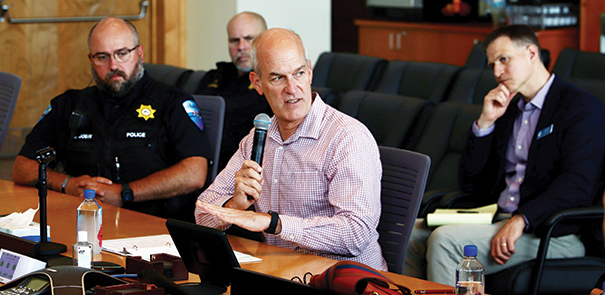
By Kalvin Valdillez, Tulalip News
By Kalvin Valdillez, Tulalip News
On the afternoon of August 6, Representative Rick Larsen (WA-02) visited with the Tulalip Board of Directors, the Tulalip Police Department, and members of the Tribe’s Treaty Rights Office and legal team to discuss a bill recently introduced to congress this month.
The bill is officially titled the Protection for Reservation Occupants Against Trafficking and Evasive Communication Act, or the Protect Act for short. If passed, this could have a major impact for tribal nations as they continue to combat the opioid and fentanyl crisis.
Tulalip Chairwoman Teri Gobin opened the gathering and shared, “First of all I want to welcome you to Tulalip and thank you for leading and introducing this bill. It’s amazing what this could do for us, the Protect Act of 2024. We’ve had 71 fentanyl overdose deaths that accounted to an actual overdose, but we’ve had a lot more deaths than that (due to addiction). The sad thing about it is the children. So many of the children are being left orphaned, both of their parents passing away from overdose. We’re having a lot of children who are born addicted, born with it in their system. So, our hands go up to you, we’re really excited about moving this forward. It’s time.”
The Protect Act addresses a glaring jurisdictional issue that currently prevents tribes from prosecuting non-tribal members for illiegal drug activities on the reservation. The act is specific to drug trafficking, but it is key to battling the crisis and preventing loss of life on reservations throughout the country and a big step for tribal court systems.
Providing a little historical context, Vice-Chair Misty Napeahi explained, “The Oliphant v. Suquamish Indian Tribe was passed by the United States Supreme Court in 1978, which literally took away the ability for tribes to prosecute non-tribal people on the reservation, and that is steeped very much in racism. I feel really thankful for you and the other congress people that are going to sign on to this bill for standing up for tribes. The people that bring the drugs in, they’re not dumb. They understand jurisdictional issues and they fully capitalize on it.”
BOD Glen Gobin added, “Across this nation there’s a fentanyl epidemic that every state is dealing with and are feeling the impact. For tribes, it’s even more difficult because of the jurisdictional questions that come up, who has criminal authority over non-Indians on the reservation. This bill looks to address that and bring safety to our community to deal with this. We’re looking to protect all of our citizens on the reservation and stand up and be part of this, fight against this epidemic that we’re all dealing with.”
In Larsen’s official press release, he surmises the Protect Act, and it reads as follows:
Specifically, the PROTECT Act:
- Provides parity for Tribal courts to issue search warrants for certain electronic communications, including social media, by adding Tribal courts to the list of courts with “competent jurisdiction” under the Stored Communications Act.
- Expands Special Tribal Criminal Jurisdiction (STCJ) to crimes associated with drug trafficking.
Amends the Bureau of Prison’s (BOP) Tribal Prisoner Program (TPP) by expanding eligibility to offenders who commit drug-trafficking-related offenses.
According to the Snohomish County Opioid Overdose and Prevention Data and Dashboard, there were 188 overdose deaths in our county alone last year. There have been numerous studies from the likes of the CDC and Washington Post that show Native communities have been hit the hardest by the opioid crisis.
The Washington State Department of Health’s Opioid and Drug Use Data Dashboard gives detailed and up-to-date statistics about the epidemic in real time. If you navigate their website and pull up overdose deaths stats based on demographics, the results are shocking. For all other races and ethnicities, there was an average of about 30 deaths per 100,000 people in 2022. The number for Alaskan Natives/American Indians was literally off the charts, with over 120 deaths per 100,000 population.
Director of Treaty Rights Office, Ryan Miller, expressed, “I’m very excited to continue to push this forward and add this as another tool in our ability to fight this problem on our reservation; for the surrounding communities as well. Yeah, we’re focused on the Tribe, we’re focused on the reservation, but this affects everybody, all of the communities around us. We’ve got so many tools that we’ve been successful with, the Healing Lodge and so many other things that have helped us bring our members out of addiction and back in the community. And those have been fantastic, but without that tool to be able to put away the people who bring these drugs on the reservation and commit these crimes against our community members, we’re not going to be successful. This is a huge step towards that.”
You can follow the bill as it goes through the process of becoming a law, as well as read it’s official text, by visiting https://www.congress.gov/bill/118th-congress/house-bill/9310?s=1&r=1.
Said Representative Larsen, “I look forward to working with you all to get the Protect Act passed and signed into law to ensure that tribes have the tools to combat the opioid epidemic and save lives. I raise my hand to all of you for the important work that you’re doing to save lives and make your communities safer.”